- Home
- Julie Hyzy
Fonduing Fathers Page 5
Fonduing Fathers Read online
Page 5
She sighed. “I just ask that you present a balanced picture.”
I had no problem with doing that and said so.
“Thank you.” Visibly relaxed now, she and I returned to the kitchen. We heard scuffling and bumping, much like the sounds a nine-year-old would make to avoid being caught eavesdropping.
Mrs. Hyden took the lead. “Josh,” she said in a commanding mother’s tone, “what have I told you about listening in on adult conversations?”
I bit my lip, thinking of the countless times I’d lingered in doorways. A bad habit I’d never been able to shake.
He stood at the small kitchen’s center island, crushed cookies in front of him, innocent face staring up at us as we walked in. I could tell he was working hard to keep emotion at bay, but his dark eyes were big and his lips turned down. The bottom one didn’t quiver, but I thought that was just a matter of time. Depending on what Mrs. Hyden said next.
“Were you listening at the door?” she asked.
He nodded.
She gave a little huff of impatience, but when she looked at her son her gaze softened and she continued gently, “You know you’re not supposed to do that.”
His fingers gripped the edge of the countertop. “I thought Dad liked the food I made for him.”
She was quick to comfort, crouching to put her arms around him. “Of course he does, honey. That’s why we talked to Ollie about working with you. We believe in you. She does, too.” She sent a pleading look my way.
“You’re talented, Josh,” I said sincerely.
He rubbed his nose with the back of his hand.
I took a step closer. “I mean that. I knew I wanted to be a chef at about the same age you are right now.”
His eyes brightened but he remained skeptical, giving me the you’re-just-saying-that-to-keep-me-from-crying look I’d seen on kids before.
“If you heard everything your mom said,” I went on, hoping to stave off tears, “you know that your parents believe in you. They believe you’ll be great at whatever you choose to do. Your dad might have other plans, but that doesn’t mean that his are right and yours are wrong.” I was treading choppy waters here, but Mrs. Hyden’s pointed look encouraged me to continue. “It doesn’t mean that there aren’t other options out there that you might love as much or more than being a chef. What we’re doing here”—I held my arms out expansively—“is experimenting to see if this really is what you want to do with your life. Your mom asked me to show you all of it—even the negative parts—and she’s right to do that. The more information you have, the better choices you’ll make.”
I feared I’d talked too much. Josh had squirmed out of his mother’s hold and begun cracking the cookies in half again. After a few moments, he looked up. “I want to know the negative parts, too. I want to know all of it.” He got a superior look on his face, one that I found adorable. “I never said I thought everything would be easy.”
I smiled. Mrs. Hyden stood. “Then we’re all in agreement,” she said with relief. “You know that your dad is always proud of you. I think the problem comes when he expects you to like everything he likes.”
Josh snickered. “He picks basketball over football. Everybody knows football is better.”
Crisis averted for now, Mrs. Hyden whispered her thanks, and left the two of us to get started.
About two hours later, as Josh and I were cleaning berries for one of the salad choices, I heard a familiar voice boom, “Something smells wonderful.”
President Hyden strolled into the family kitchen, his wife right behind him. I could tell from their body language and from the apprehensive look on Mrs. Hyden’s face that she’d engineered this little impromptu visit.
“Good morning, Mr. President,” I said.
At the interruption, Josh burst into a detailed account of all we’d done, and although he was animated and cheerful, I could detect a wary look in his expression, as though gauging how his father might respond.
For his part, President Hyden appeared in control yet slightly uncomfortable. “I understand you’re getting lessons from the best of the best,” he said with a nod to me.
I wished he would forget social niceties for a moment, ignore my presence, and concentrate on Josh, but he continued addressing me, saying, “Denise and I thank you for the time you’re spending with our son. We understand you’re giving up your day off to be here.”
“It’s my pleasure,” I said.
Josh eagerly directed his father’s attention to the cheesecake, now cooling on a nearby rack. While President Hyden said all the right things and patted Josh on the shoulder as the boy explained the steps we’d followed to create it, he did so distantly. I could sense Josh picking up on his dad’s distraction.
Talking louder and faster, Josh tugged at his father’s hand and finally the president seemed to push himself into the moment. It wasn’t as though he was being a bad parent, he just came across as a man with too much on his mind. As the leader of the free world, I imagined he had plenty of urgent topics competing for attention. Taking even these precious minutes to spend with Josh must have involved a logistical nightmare.
He was doing his best. Josh was doing his best. Unfortunately, it didn’t seem to be enough for either of them. As a non-family bystander, there was nothing I could do but watch.
Nine-year-old boys might not be as savvy to another person’s mood as political leaders were, but they sure demanded as much effort and attention, if not more.
“We’re almost done for the day,” I said when President Hyden asked what we would be doing next. “All that’s left is to set up our next lesson.”
“How about tomorrow?” Josh asked.
His mother intervened. “We’re going to visit your cousins tomorrow, remember?”
Josh’s face lit up. “I forgot. We’re coming back Friday, aren’t we? Can we do it then?”
Mrs. Hyden opened her mouth, clearly to argue.
“Or Saturday,” he said, determined to not let me leave without a commitment. Turning to me, he asked, “Can you come back Saturday?”
“Saturday is the Food Expo,” I said. “Marcel is speaking there and I promised I’d come listen. My tickets just arrived in the mail today, as a matter of fact. I’d planned to take my team, but that isn’t going to work.” I didn’t want to tattle about how Virgil’s spur-of-the-moment day off was messing up plans, but I sure felt like it. “It looks like I may be going alone.” Or with Gav, if I could talk him into it.
Josh’s eyes lit up. “Can I go with you? That sounds like it would be a lot of fun.”
The president’s expression hardened briefly. He was behind Josh, so the boy didn’t see it.
“I don’t know,” I said, glancing up at his mother. “It’s not up to me.”
She held her hands out and turned to her husband for his opinion. President Hyden squinted, then ruffled his son’s head. “Tell you what, sport, I’ll talk to the Secret Service. You know how tough it is to arrange these things and Saturday doesn’t give us much lead time.”
“Please, Dad? I know this will be awesome.” His big round eyes widened. “I’m sure there will be a lot for me to learn there. All the fun stuff and even the negative parts as well.”
Who said this boy wasn’t an effective negotiator?
The president glanced at his wife, then turned to me. “Would this be all right with you?” he asked.
“Of course,” I answered enthusiastically, even though that killed the idea of bringing Gav.
With a practiced smile, the president said, “If there’s one thing we know we can count on, it’s that our son is safe with you.” Ruffling Josh’s hair again, he excused himself.
“This is great!” Josh said as soon as he was gone.
“Don’t get your hopes up, honey,” Mrs. Hyden said. “You don’t know what the Secret Service is going to say about this.”
“Dad said it was okay. That’s all that matters, right? They have to say it’s okay, too!” Fo
r a second time, he exclaimed, “This is great!” and as his mother sighed, he went back to cleaning berries.
CHAPTER 6
WEDNESDAY MORNING DAWNED WELL BEFORE I woke up, which was unusual for me. I liked to get into the White House no later than seven in the morning, most times even earlier than that. Today being a day off, and, in fact, one of several in a row, provided the delightful luxury of sleeping in. I rolled over, guessing by the level of sun pouring in through the window that it had to be around eight A.M. A peek at my alarm clock confirmed it.
Positively decadent.
An hour later I was fed, showered, dressed, and I’d spent enough time online to map out my route for the day. I called Gav and left a message, telling him that I’d be out for a while, but that I’d try again when I returned. I’d called him last night. His phone had gone directly to voicemail then, too.
When he’d finally gotten back to me last night, I’d been half-asleep. He’d sounded tired and had been vague about where he’d been and what he’d been doing. That wasn’t like him. The only times he ever hedged on the truth were when national security issues were at stake. I didn’t believe that was the case here, but I wasn’t about to spend time worrying.
Gav inspired trust. It was amazing to me how freeing and how wonderful life was when you truly trusted another person. I knew he would bring me up to speed whenever he could and I expected it would be soon. We were both on vacation this week and he’d made it clear he intended to spend as much of that as possible with me. We’d taken a long time to finally cement our relationship and that meant we had a great deal of catching up to do.
I made it outside without being waylaid by either Mrs. Wentworth, my nosy neighbor, or James at the apartment building’s front desk. I’d chosen to wear a bright green sleeveless shirt over cotton cargo pants, and as I made my way across the already warm asphalt to my little car, I was happy I’d chosen such cool clothing. It would be a hot one today, no question about it.
Although the Metro ran to Bethesda, Maryland, I would have had to take a train into D.C. and then transfer to get there. My destination was off the beaten path, and I wanted the freedom to move about. Plus, I liked driving. What with my hours at the White House and the little downtime I’d had in recent months, I didn’t often get the chance to do much of it.
Twenty minutes later, I was exiting 495 North following a long ramp that led me into a lovely area with sprawling homes, tree-lined streets, country clubs, and tennis courts. I took the turns MapQuest had suggested and followed a small road almost to its end. I double-checked the address. There it was: Eugene Vaughn’s home. The retired army general, the much-decorated man who had been so kind and yet so mysterious in my mother’s hour of need, was definitely still alive.
Whoever he was, I thought as I shut the car door and made my way up, he’d done well for himself. The home was a colonial-style redbrick, boasting huge gridded rectangular windows with black shutters and a shaker roof with three small gabled windows that promised cozy attic bedrooms. The garage was attached to the west of the home and I parked on its driveway, making my way eastward along the path to the front door.
My heart pounded as I lifted the brass door knocker and banged it, announcing myself. I knew little about this man. I had no idea how I would be received. No idea if he would recognize my name.
A woman answered. Taller than me, she had a wide forehead, blonde hair down to her shoulders, and carried an extra forty pounds. She wore pale blue cotton pants, gym shoes, and a bright patterned top cut in unmistakable healthcare provider couture. “May I help you?” she asked.
“Hi,” I said, at once worried that I might be intruding on a sick man. “I don’t mean to bother you, but I would like to speak with Mr. Eugene Vaughn, if that’s possible.”
Her eyes dimmed, her jaw set almost imperceptibly, but she maintained a friendly tone. “Is he expecting you?”
I took a deep breath. “No,” I admitted. “Believe it or not, I could find his address but not his phone number.”
She crinkled her nose. “It’s unlisted.”
“I know. I was surprised to even find his address.” Truth was, I’d pulled a couple of strings to get my hands on it.
We’d been talking for less than thirty seconds and already I’d exhausted her patience. “My name is Olivia Paras,” I began again. “Mr. Vaughn knew my father a long time ago. He—Mr. Vaughn, that is—helped my mom a great deal when my father died.”
She relaxed slightly, probably relieved I wasn’t there to sell anything, sway Vaughn’s political opinions, or attempt to convert him.
I took advantage. “My mother recently told me about Mr. Vaughn’s assistance and I wanted to talk with him myself, if that’s possible.”
She nodded thoughtfully. “Eugene doesn’t get a lot of visitors,” she said. “I’ll ask him. Fair enough?”
“Absolutely,” I said, hoping he wouldn’t turn me away.
She had me repeat my name and provide my dad’s. “Wait here a minute,” she said and shut the door.
I didn’t know how much time to give her, but the point was moot. She was back before I could compose a text to Gav. Opening the door wide, she said, “Come on in.”
The entrance hall smelled of lemon wax, coffee, and disinfectant. “My name’s Roberta. I’m one of Eugene’s caregivers.” As she led me into the living room, she added, “Here you are.”
Seated in an oversized burgundy chair, Eugene Vaughn stared at me from beneath bushy eyebrows. With his wild, tufted hair, he reminded me of Albert Einstein.
He blinked several times, working his mouth. “What’s your name again?”
“Olivia Paras,” I answered, wondering why I’d been granted an audience if he didn’t know who I was. “Anthony Paras’s daughter.”
“Anthony Paras,” he said, squinting into the distance. “There’s a name I haven’t heard in a very long time. Come closer. Let me have a look at you.”
I crossed the long, sun-filled room. Taupe walls, white wood trim. Two of the tall windows I’d passed as I’d made my way to the door flanked the white-paneled fireplace. Cinnamon filled the air in here. An expansive ruby rug covered most of the hardwood floor. The sofa was camel colored and sported a multitude of throw pillows in various patterns featuring garnet, beige, and yellow. Lit candles—the source of the cinnamon aroma, no doubt, and effective chaser of sickroom smells—were perched here and there. Accessories and coffee table books, showcased everywhere, completed the tableau.
There was no television in the room. Eugene Vaughn sat with a book open on his lap. He held it up when he saw me take notice. “Fahrenheit 451,” he said. “Good book.”
“Yes, it is.”
He wagged a finger toward Roberta. “She tells me I’ve read it before.” He shrugged, then leaned forward and placed the volume on the low table before us. “I remember parts of it.”
“I’m very glad to meet you, Mr. Vaughn,” I said stiffly.
He peered at me. “For goodness’ sake, child, take a seat. And call me Eugene. None of this Mr. Vaughn nonsense.” He pointed a gnarled finger at a nearby wooden chair with red-and-white-checkered cushion. “Pull that up.”
I complied.
“Tony’s daughter, you say? The last time I saw you, you were a little pipsqueak. Grown up a bit, have you?”
“A bit,” I said.
Eugene faced his caregiver, who’d remained in the doorway. “Roberta, dear, do we have any sweet tea to offer our guest?”
She smiled. “I’ll go check.”
I was about to tell her not to bother with anything for me, but thought better of it. Mr. Vaughn’s apparent willingness to spend time talking was exactly what I’d come for, wasn’t it?
“Thank you for seeing me,” I said.
“Hah!” he barked as though I’d said something funny. “It was just a matter of time. Good thing you got here before I kicked the bucket. According to my doctor, that could be any day now. How is your mother?”
&n
bsp; “Doing well, thank you.”
He got a wistful look in his eyes. “She had a rough time of it when your father died.”
“Yes,” I said, encouraging him. “She told me a little bit about how you helped her.”
“I did, didn’t I?” he asked rhetorically. “You look like her. Look like your dad, too.”
Steering back to the topic, I said, “My mom told me a bit about everything that went on when my dad was killed. It seems there’s more to the story than she knows.”
I waited for him to agree. Instead, he grunted. “And you’re here because?”
“Because I hope you’ll tell me the rest of the story.”
“Rest of what story?” he asked.
Though frustrated, I wasn’t ready to give up. I wondered briefly if he was toying with me. His colorless eyes were alert, probing. Though they were clouded with cataracts, they bore into me with shrewd assessment.
“You managed to get my father into Arlington,” I said. “After a dishon—”
“Stop right there.” He sliced the air with his hand, a commanding motion rendered all the more poignant by the quivering of his fingers. “You’re moving too fast for this old man. Taxing my limited memory.” I had my doubts about that. “I want to talk about you, first. Quite the reputation you have there, little girl.”
Taken aback, I said, “What do you mean?”
“What, you think because I live alone and have nurses hovering over me that I don’t keep up with the world? You’ve made a name for yourself. Gotten into a few scrapes along the way, eh?”
I could barely form words. “You know…me?”
“Been following your career ever since you came to D.C. as an assistant chef. Your mom would write me once in a while to tell me where you were studying or where you were working.”
“Oh,” I said, flabbergasted. “She never mentioned that.”
“Nope,” he said, utterly unsurprised by my proclamation. “Your father, your mother. Trustworthy people. Ask them to keep a secret, they keep it.” He waggled his eyebrows. “You haven’t been booted from your position, despite all the trouble you’ve gotten into, so I have to assume you inherited that trait, too.”

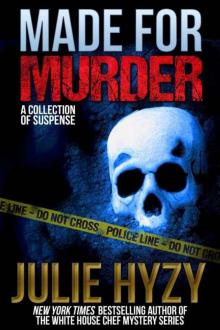 Made for Murder
Made for Murder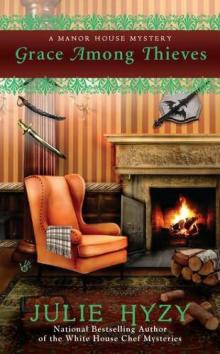 Grace Among Thieves
Grace Among Thieves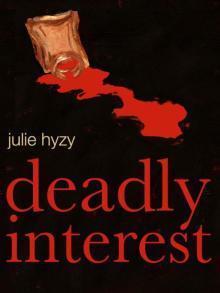 Deadly Interest
Deadly Interest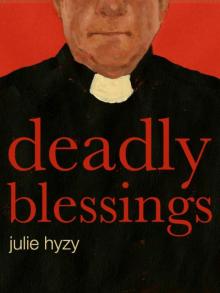 Deadly Blessings
Deadly Blessings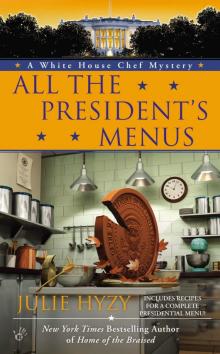 All the President’s Menus
All the President’s Menus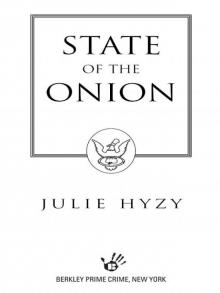 State of the Onion
State of the Onion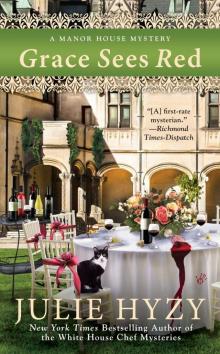 Grace Sees Red
Grace Sees Red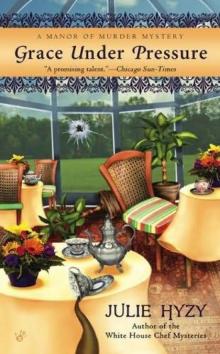 Whitehouse Chef 04 - Grace Under Pressure
Whitehouse Chef 04 - Grace Under Pressure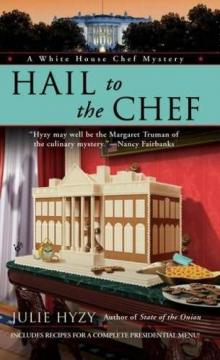 Hail to the Chef
Hail to the Chef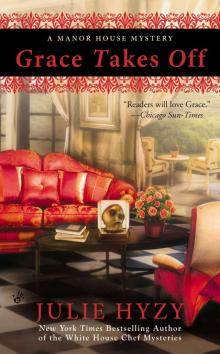 Grace Takes Off
Grace Takes Off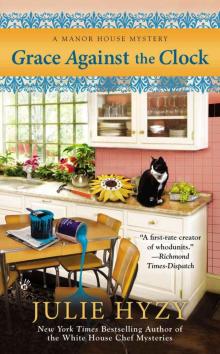 Grace Against the Clock (A Manor House Mystery)
Grace Against the Clock (A Manor House Mystery) Grace Cries Uncle
Grace Cries Uncle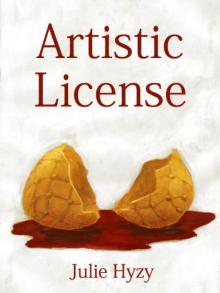 Artistic License
Artistic License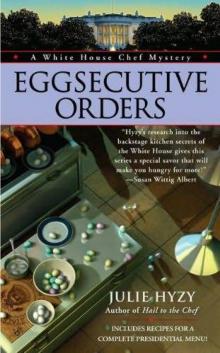 Eggsecutive Orders
Eggsecutive Orders Grace Interrupted
Grace Interrupted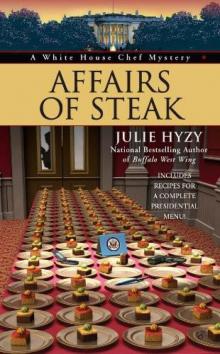 Affairs of Steak
Affairs of Steak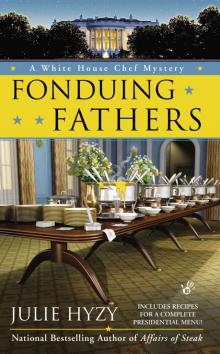 Fonduing Fathers
Fonduing Fathers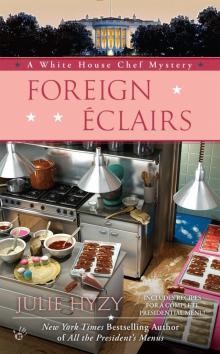 Foreign Éclairs
Foreign Éclairs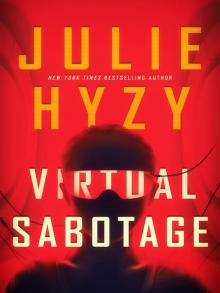 Virtual Sabotage
Virtual Sabotage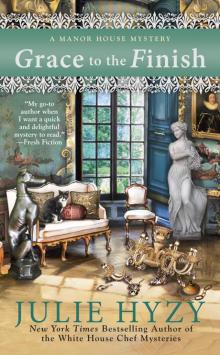 Grace to the Finish
Grace to the Finish